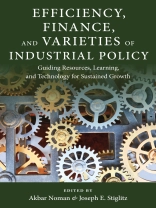Industrial policy, once relegated to resource allocation, technological improvements, and the modernization of industries, should be treated as a serious component of sustainability and developmental economics. A rich set of complimentary institutions, shared behavioral norms, and public policies have sustained economic growth from Britain’s industrial revolution onwards. This volume revisits the role of industrial policy in the success of these strategies and what it can offer developed and developing economies today. Featuring essays from experts invested in the expansion of industrial policies, topics discussed include the most effective use of industrial policies in learning economies, development finance, and promoting investment in regional and global contexts. Also included are in-depth case studies of Japan and India’s experience with industrial policy in the banking and private sector. One essay revisits the theoretical and conceptual foundations of industrial policy from a structural economics perspective and another describes the models, packages, and transformation cycles that constitute a variety of approaches to implementation. The collection concludes with industrial strategies for facilitating quality growth, realizing more sustainable manufacturing development, and encouraging countries to industrialize around their natural resources.
Inhoudsopgave
1. Learning, Industrial, and Technology Polices: An Overview, by Akbar Noman and Joseph E. Stiglitz
Part 1: Theoretical and Conceptual Foundations
2. Industrial Policies in Learning Economies, by Mario Cimoli and Giovanni Dosi
3. Dynamic Efficiency: Structural Dynamics and Economic Growth in Developing Countries, by José Antonio Ocampo
Part 2: Development Finance
4. Uncertainty, Investment, and Financing: The Strategic Role of National Development Banks, by João Carlos Ferraz
5. The Roles of Development Banks: How They Can Promote Investment in Europe and Globally, by Stephany Griffith-Jones and Giovanni Cozzi
6. Inside the Black Box of Japan’s Institution for Industrial Policy: An Institutional Analysis of the Development Bank, Private Sector, and Labor, by Go Shimada
7. Development Banks and Industrial Finance: The Indian Experience and Its Lessons, by Deepak Nayyar
Part 3: Practice and Proposals
8. Industrial Policy Revisited: A New Structural Economics Perspective, by Justin Yifu Lin
9. Varieties of Industrial Policy: Models, Packages, and Transformation Cycles, by Antonio Andreoni
10. Industrial Strategies: Toward a Learning Society for Quality Growth, by Akio Hosono
11. Could Technology Make Natural Resources a Platform for Industrialization? Identifying a New Opportunity for Latin America (and Other Resource-Rich Countries), by Carlota Perez
12. Manufacturing Development: The Role of Comparative Advantage, Productivity Growth, and Country-Specific Conditions, by Nobuya Haraguchi
13. Does Manufacturing Colocate with Intermediate Services? Analyzing the World Input-Output Database, by Ming Leong Kuan
Acknowledgments
Contributors
Index
Over de auteur
Akbar Noman is senior fellow at the Initiative for Policy Dialogue and adjunct professor of international and public affairs at Columbia University. He is coeditor, with Joseph E. Stiglitz, of Industrial Policy and Economic Transformation in Africa (Columbia, 2015). Joseph E. Stiglitz is University Professor at Columbia University. A recipient of the Nobel Memorial Prize in Economic Sciences (2001), his books include Creating a Learning Society: A New Approach to Growth, Development, and Social Progress (Columbia, 2014) and Rewriting the Rules of the American Economy: An Agenda for Growth and Shared Prosperity (2015).












